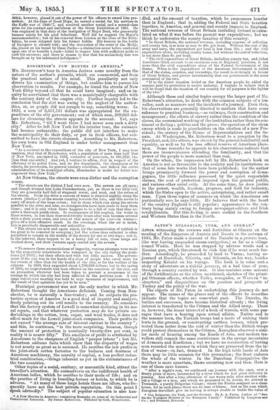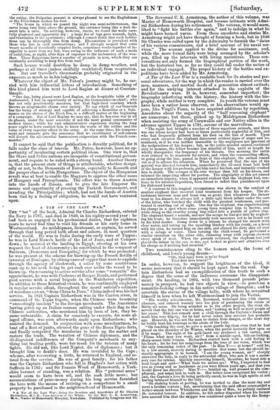BATON'S BULGARIAN, TURK, AND GERMAN. *
ArrEn witnessing the reviews and festivities at Olmiitz on the meeting of the Emperors of Austria and Russia in the autumn of 1853, Mr. Paton made a descent of the Danube in a private boat, (the war having suspended steam-navigation,) as far as a village named Wadin. Here he was stopped by adverse winds and a Russian gun, which threatened to sink him if he went much fur- ther. Accordingly, he proceeded by land to Varna ; having so- journed at Itustchuk, Silistria, and Schumla, on his way, besides inspecting Kalafat on his voyage. The book is in some sort a story of adventure on a riskful journey, at a bad time of year, through a country excited by war. It also contains some account of the fortifications at the cities mentioned, sketches of the princi- pal Ottoman officers, whether Turks, renegades, or Western "in- structors," and disquisitions on the position and prospects of Turkey and the policy of the war.
The objects of Mr. Paton in undertaking. this journey do not appear. The names of the places and of the officers he describes indicate that the topics are somewhat past. The Danube, its battles and successes have become historical already ; the living interest is transferred to the Crimea and the Allied army. There is, however, the lesser interest of a book of travels, with some pas- sages that have a bearing upon actual affairs. Native and to the manner born, the Turkish troops had a mode of sinking their tents in the ground, or constructing earthen houses, which pro- tected them better from the cold of winter than the British troops could protect themselves in the Crimea. Xenophon observed a simi- lar mode of housing among the Kurds of Asia, and modern tra- vellers still remark the same contrivance in the savage mountains of Armenia and Kurdistan ; but we have no recollection of having seen recorded the manner in which they are preserved from the in- flux of water—in fact, drained. In the high table lands of Asia there may be little occasion for this precaution ; the frost endures the whole of the winter. In the Danubian Principalities the weather is more uncertain, thaws occurring now and then. Here is
one of these cave houses.
"After a night's rest, we continued our journey with the oxen, over a dreary plain of snow, intersected by a river which we had great difficulty in passing. And after a long afternoon of one weary mile after another with- out a village or a tree, and which we presumed to be downs, we arrived at Trestanik, a purely Bulgarian village; where the Kiahia assigned us a clean house, for in such places there are no inns or khans. And as the BUM which European travellers give on leaving is always double or treble the value of • The Bulgarian, the Turk, and the German. By A. A. Paton, Author of "Ser. via the Youngest Member of the European Family." Published by Lougmaa mad Co.; and Froment, Brussels. the outlay, the Bulgarian peasant is always pleased to see the Englishman or the Frenchman darken his door.
"The house in which we passed the night was semi-subterranean, the eaves being very little above the ground, the entrance being like a dark de- scent into a cave. On arriving, however, inside, we found the walls care- fully plastered and apparently dry : a large fire of logs gave warmth, light, and ventilation to the apartment ; although I cannot think that such habita- tions can be thoroughly free from damp. Rheumatism is prevalent with those who live in such constructions ; and I strongly suspect that some weary months of wretchedly crippled limbs, sometimes weeks together of in- capacity to move from my bed, were owing to the influence of such a mode of habitation, at night, after days of exposure to the inclemency of the wea- ther. These Bulgarians have a number of utensils in iron, which they are constantly scrubbing to keep free from rust."
Such houses would doubtless be damp in damp weather, and perhaps at all times (unless skilfully ventilated) from respiration, 8ro. But our traveller's rheumatism probably originated in the exposure as much as in his lodgings. Whatever the object of Mr. Paton's journey might be, he car- ried with him influential letters of introduction. Something of this kind placed him next to Lord Raglan at dinner at Constan- tinople.
"One day, being placed next Lord Raglan, at the hospitable table of the Ambassador, I bad an opportunity of seeing the Commander-in-chief ; who has not only gentlemanly manners, but that high-bred courtesy which throws an unspeakable charm over society. To say which of our Generals has the bump of strategy and capable of achieving a Ramillies or a Sala- manca on the shores of the Black Sea, is a difficult matter at the beginning of a campaign. But of Lord Raglan we may say, that he has seen war in all its phases, under the most scientific if not the most genial commander of modern times ; while his vast administrative experience during the long peace ought to have enabled him to know the wants of the soldier and the value of every superior officer in the army. At the same time, his tempera- ment and manners give the assurance that no exorbitancy of self-esteem will disturb the all-essential harmonious cooperation with the French com- mander." •
It cannot be said that the publication is directly political, for it falls under the class of travels. Mr. Paton, however, loses no op- portunity of inculcating certain political ideas. One view is, that the Slave and Celtic nations are incapable of constitutional govern- ment, and require to be ruled with a strong hand. Another theory is, that the present state of things is attributable, whether design- edly or not, to the Democrats of Europe, especially to Kossuth and the pauper class of noble Hungarians. The object of the Hungarian revolt was at best to enable the Magyars to oppress the other races of Hungary and Transylvania. The effect was to throw Austria into the hands of Russia, and to give the late Emperor the means and opportunity of pressing the Turkish Government, and invading the Principalities; ; which, had not the hands of Austria been tied by a feeling of obligation, he would not have ventured upon.



































 Previous page
Previous page